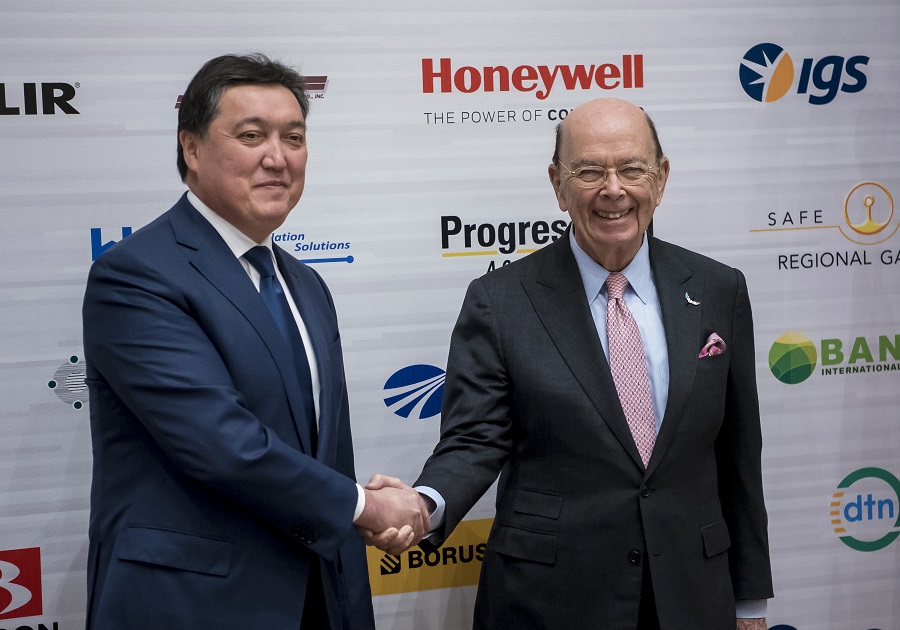The United States and Kazakhstan have signed a series of deals during Secretary of Commerce Wilbur Ross’s two-day visit to Kazakhstan this week, ranging from projects that will focus on agriculture and aircraft manufacturing, to infrastructure and information technology.
As a part of Ross’ visit on Wednesday and Thursday, he met with President Nursultan Nazarbayev and attended a business forum in Astana that brought together more than 100 companies from the U.S. and Kazakhstan.
Eight bilateral documents were signed on Thursday according to reporting by Atameken Business. Signatories include an irrigation equipment manufacturer, Valmont Industries; weather equipment manufacturer Baron Services; Honeywell and Mastercard. The total value of deals signed were not disclosed.
“It should be noted that as a result of the agreements reached, the overall economic indicators of Kazakhstan-US business relations have significantly increased,” said First Deputy Prime Minister of Kazakhstan Askar Mamin. “Positive growth dynamics are observed in the increase in commodity turnover between Kazakhstan and the United States by 29 percent,” he added referencing figures for the past nine months.
“The total inflow of investments from the United States increased by 44.7 percent,” Mamin said, referring to the first half of this year. Trade between the two countries reached $1.3 billion in 2017, according to the Office of the U.S. Trade Representative.
Sierra Nevada Corporation, an electronic systems provider, inked a $150 million deal with Kazakhstan Engineering. The deal calls for joint development of regional airliners in Kazakhstan.
“The capacity of this aircraft is about 40 seats. It is a small plane that will allow connecting small cities of Kazakhstan to each other,” Zhandos Temirgali, who heads Kazakhstan Engineering, said Thursday according to reports by Atameken.
The first certified U.S. trade mission to Kazakhstan comes after President Nazarbayev’s visit to Washington in January, where American and Kazakhstani companies signed $7 billion worth of deals.
Officials in Washington see Kazakhstan, one of the world’s largest countries and the most developed in Central Asia, as a promising market for business though they are thousands of miles apart.
“If previously the main areas of American capital were the mining and energy sector of Kazakhstan, today we intend to invest in infrastructure development, processing, engineering, the agro-industrial complex and a number of other high-tech areas,” the official website of Kazakhstan’s prime minister cited Ross as saying.
Kazakhstan has received more than $40 billion worth of investments from the U.S. Chevron was the first American company to make inroads into Kazakhstan, in 1993. As of today, the U.S. is involved in 17 sectors of the Kazakhstani economy, worth several billions of dollars that include areas such as energy, agriculture, insurance and infrastructure.
Daniel F. Runde, Senior Vice President at the Washington-based Center for Strategic and International Studies (CSIS) believes there are still a lot of business opportunities in Kazakhstan, including those related to metallurgy and other areas of science and technology.
“I believe that we should consider Kazakhstan in a wider context and consider its role both in the Belt and Road initiative and in the Central Asian trade relations,” the expert said earlier this year, according to reports by Atameken, referring to China’s mega-logistics project.
Meanwhile, Ross’s Kazakhstan visit came after Kazakhstan’s National Economy Minister, Timur Suleimenov, visited Washington on October 12. Suleimenov also met with U.S. Senators Chris Van Hollen (D-MD) and Mike Crapo (R-ID), who said that U.S. sanctions against Russian businesses will not affect Kazakhstan, which is ranked as Russia’s largest trade partner in the post-Soviet sphere.
“The economic interests of Kazakhstan, as well as the interests of the U.S. investors in Kazakhstan, will be taken into account when considering various sanction bills in the Senate,” the press service of Kazakhstan’s National Economy Ministry said after the meeting, according to reports published by Informburo.
But some experts disagree, saying sanctions against Russia will have an effect on what is Central Asia’s largest economy.
“The reason is simple: for us, Russia is the most important political and economic partner, while the United States may set some terms related to trade and economic cooperation, for example, do not buy products from a Russian company or something like that,” Kazbek Beisebayev, a former diplomat based in Kazakhstan, told Kursiv.
Last year Kazakhstan’s imports from its giant northern neighbor exceeded the entire volume of the country’s trade with any other country, reaching $12.3 billion.
Kazakhstanis have already felt the pinch of sanctions, after the exchange rate of the tenge, Kazakhstan’s national currency, fell this fall when the weighted average dollar rate amounted to nearly 380 tenge, near surpassing its record low in February 2016.







 The number of evacuees from flooded areas in Kazakhstan has reached 97,852 people, including about 32,856 children since March 27.
The number of evacuees from flooded areas in Kazakhstan has reached 97,852 people, including about 32,856 children since March 27.
 The Islamic holy month of fasting, Ramadan comes to an end this week with the celebration of a joyous festival called Eid (meaning “festival” in Ar...
The Islamic holy month of fasting, Ramadan comes to an end this week with the celebration of a joyous festival called Eid (meaning “festival” in Ar...
 Iran's senior military leaders described the drone and missile attack on Israel on April 14 night as “successful".
Iran's senior military leaders described the drone and missile attack on Israel on April 14 night as “successful".
 Iranian President Ebrahim Raisi warned Israel that it would face a "real and extensive" response if it makes any "mistake" following Tehran’s missi...
Iranian President Ebrahim Raisi warned Israel that it would face a "real and extensive" response if it makes any "mistake" following Tehran’s missi...



